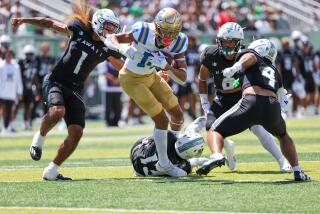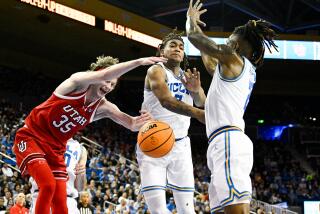Breaking his Cardinal Rule
- Share via
Maybe there is nothing more Arthur Lee can say.
Maybe no words can mollify what he did in the waning moments of the Midwest Regional final last Sunday.
The Stanford point guard played heroically that afternoon, sinking a string of tough shots and making the steal that finally pushed his team into the lead.
But as Rhode Island guard Tyson Wheeler missed two free throws with five seconds remaining, Lee raised his hands to his neck and, with an entire arena watching, flashed the “choke” sign.
It was boorish and all too common in an era of fading sportsmanship. It also came from an improbable source, from a quiet young man who has a reputation for being well-mannered.
Lee has tried to explain.
“If I was in my right mind, there’s no way that would have happened,” he said in a public apology this week. “I’m sure everyone in the whole world could see I was intense and just gone.”
Maybe his defense is better left to family and friends, to the people who think they know what went wrong.
Begin with his father. From up in the stands, Arthur Lee Sr. watched horror-struck.
“It was like Art was possessed,” he said. “His facial expressions . . . he was going on 100% adrenaline.”
This was the son of an insurance salesman and a schoolteacher, a kid who never made trouble, never had to be told to do his homework.
“The kid was so very quiet,” his father said. “You could be in a room with Art for an hour and, if you didn’t say anything to him, he wouldn’t say anything to you.”
Not that Arthur Sr. is making excuses. He delivered a few choice words to his son after the game, and there will be a few more after the tournament. Of the behavior, he said: “It will never happen again, I assure you.”
Yet the father understands: There was so much at stake, so much to prove.
Go back four years to Lee’s senior season at North Hollywood High when the 6-foot, 170-pound player was being heavily recruited. Among the suitors was UCLA and then-coach Jim Harrick.
The Bruins wanted a guard and Lee wanted to stay close to home. But there were questions about Lee’s shooting ability. The scholarship ultimately went to Brandon Loyd, now a seldom-used guard on the UCLA squad.
Lee was glad to end up at Stanford, a school whose academic tradition fit the near-4.0 grade-point average he carried through high school. Still, slights are not easily forgotten.
“You think about something like that,” Arthur Sr. said. “And then you get a chance to prove [Harrick] wrong.”
With Harrick moving on to Rhode Island, Lee got two chances. Stanford beat the Rams by one point in a tournament last December. Then came the regional final.
“I asked him about [the revenge factor],” said Steve Miller, who coached Lee at North Hollywood. “He said he was thinking about that the first time they played this season. This time, he just wanted to win.”
Miller had a long-distance telephone conversation with Lee this week. Like Arthur Sr., he gently chastised the young man. But Miller has another explanation for why Lee lost control.
It involves the pressure facing a junior who must follow in the footsteps of Stanford’s former point guard, Brevin Knight, now a Cleveland Cavalier.
“Arthur had to step up big-time this year,” Miller said. “He had to develop much more leadership.”
Lee told family and friends that he was determined to emerge from Knight’s lengthy shadow, determined to establish his own identity.
“It’s a special attribute in his personality,” Miller said. “The more he’s challenged, the better he does.”
As a boy, on shopping trips with his parents, Lee waited in the parking lot dribbling a basketball. Later, in high school, he shot for hours.
The night before the Midwest Regional, he made a promise to his father and teammate Mark Seaton.
“I won’t let us lose,” he said.
With Stanford trailing, Lee scored 13 of his game-high 26 in the final 2:02. His steal with 32 seconds remaining resulted in a three-point play for teammate Mark Madsen.
Watching on television, Eli Essa, a former North Hollywood assistant, was reminded of Lee’s final high school game.
North Hollywood was expected to lose big at highly ranked Crenshaw in the first round of the 1995 City 4-A playoffs. Lee responded with a game-high 31 points as Crenshaw held on for a 72-65 victory.
“He was doing to Crenshaw exactly what he did to Rhode Island,” Essa said. “He was in that zone, going to the hoop, hitting off-balance shots, launching them from God-knows-where.
“It was the exact duplicate.”
Oregon State Coach Eddie Payne has a similar memory, only more recent. Lee demolished the Beavers in their final Pacific 10 game of the season.
“He generated numerous baskets by taking the ball and driving it the length of the floor, either scoring it himself or kicking it,” Payne said. “And we played our best game of the season. If he didn’t do what he did, I think we would have won.”
Like others interviewed, Payne has never seen Lee taunt opponents.
“It’s probably regrettable for him, but I wouldn’t put a whole lot of stock in it,” the coach said. “He’s a good kid. This was just an anomaly.”
Anyway, Tubby Smith is not thinking much about Lee’s sportsmanship these days. The Kentucky coach is more concerned with his quickness and knack for making big plays.
“He is able to penetrate and break people down,” Smith said. “Plus, he can shoot with range.”
That range--the one that UCLA questioned, the one that killed Rhode Island--has made Lee the team’s scoring leader with an average of 14 points a game.
It could play into Kentucky’s weakness on defense.
“We have had trouble defending the three most of the year,” Smith said. “What we need to do is limit those opportunities and limit those looks.”
It could do so much more.
Arthur Sr. hopes that his son’s shooting touch will ultimately make people forget that lapse in judgment, those few moments on a Sunday afternoon that tarnished an otherwise clean reputation.
“It happened in the heat of passion and he knows it was wrong,” his father said. “We live and we learn.”
More to Read
Go beyond the scoreboard
Get the latest on L.A.'s teams in the daily Sports Report newsletter.
You may occasionally receive promotional content from the Los Angeles Times.







